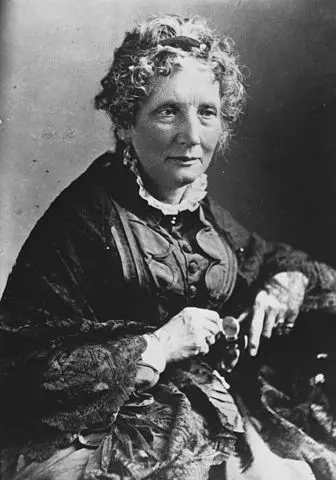Harriet Beecher Stowe
Born: 1811
Birthplace: Connecticut
Died: 1896
Harriet Beecher Stowe was an American author that was most well-known for her social activism and anti-slavery book “Uncle Tom’s Cabin.” Her belief in social justice pushed the already volatile topic of slavery so that people in all parts of the world understood its horrors.

- Born in 1811 in Litchfield, Connecticut, her father was a religious leader, and she was one of thirteen children. Harriet’s mother died when she was a child, and the religious influence in the family was such that many of her brothers became ministers. One of her sisters became a teacher and an author, affecting many of the social ideas that Harriet had, while an additional sister led the women’s rights movement.
- Harriet was educated in a school that was run by one of her sisters and was instructed in the same course selections that were usually only taught to male children. By the time Harriet was 21, she had relocated to Cincinnati, Ohio, to be with her father, who was the leader of the Lane Theological Seminary.
- Her father felt strongly against slavery and was an abolitionist that fought against the 1836 Cincinnati riots that were for slavery. Harriet started a literary association for like-minded friends called the Semi-Colon Club. She met and married a seminary teacher, Calvin Ellis Stowe, and they moved to Brunswick, Maine.
- Both Harriet and her husband were abolitionists, so when Congress passed the Fugitive Slave Law in 1850, they knew that there was cause for alarm in the communities of free Black Americans in the northern states. Harriet decided to write about her feelings and had the first section of the novel “Uncle Tom’s Cabin” published in the National Era. The next year the full book was published, and it was a best seller.
- Although her book was popular in the North, telling the stories of the terrible lives of slaves, their children, and their families, she was despised in the South, where slavery was still accepted and approved of. Many in the North turned her story into dramas and plays that were performed on stage.
- When the Civil War broke out, Harriet made a trip to Washington, D.C. to meet with President Abraham Lincoln. The way the story goes, he greeted her with, “So you are the little woman who wrote the book that started this great war.” Very little details are available about that meeting, but it signifies the importance of her book as it affected both the South and the North.
- Stowe devoted her entire life to political and social causes. She continued to write essays, textbooks, and stories, as well as an incredible list of books, including “Oldtown Folks” and “Dred.” However, nothing that she wrote ever achieved the popularity of Uncle Tom’s Cabin.
- Harriet was often asked to give opinions on current political issues, and she was well-respected in the communities in the North that shared the ideas of the abolitionists.
- Stowe spent a lot of time in Jacksonville, Florida, promoting the state as a vacation spot as well as for economic investment. Her family loved going to Mandarin Florida during the winter months, and she devoted the location and people as a topic in one of her books, “Palmetto Leaves.”
- Harriet died on July 1, 1896, in Hartford, Connecticut, at the age of 85 years. Her epitaph reads, “Her Children Rise up and Call Her Blessed.”
Q&A:
How did Harriet’s father influence her beliefs?
As a religious leader and an abolitionist
Where did Harriet receive her education?
At a school run by one of her sisters
What was the name of the book that elevated Harriet Beecher Stowe to international fame?
Uncle Tom’s Cabin
During the Civil War, who did Harriet Beecher visit in Washington, D.C?
President Abraham Lincoln
What southeastern U.S. state did Harriet Beecher Stowe often visit?
Florida
What was the name of the literary club that Harriet started?
Semi-Colon Club



